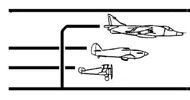The attempt by Harry Hawker to fly across the Atlantic Ocean, May 1919 – as reported by the Surrey Comet
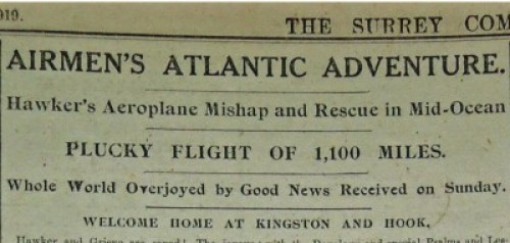
Surrey Comet headline 28th May 1919
“Mr Harry Hawker, the intrepid Sopwith pilot, and his brave comrade, Lieut -Commander Mackenzie Grieve, finding the weather conditions favourable, made ther start from Newfoundland on the afternoon of the 18th, with high hopes of a successful venture, which were backed by the universal sympathies of their countyrmen, and not least by the residents of Kingston and Surbiton to whom Mr Hawker is so well known”
Thus the Surrey Comet Mid-Weekly, in its editorial of Wednesday 21 May 1919, reported the start of the flight. But the flight had been expected to take about 24 hours so, it being three days later already, the leader continued that “ … he dropped his undercarriage and … vanished into the blue. Since then not a word has been heard or a trace seen of the airmen or their machine.”.
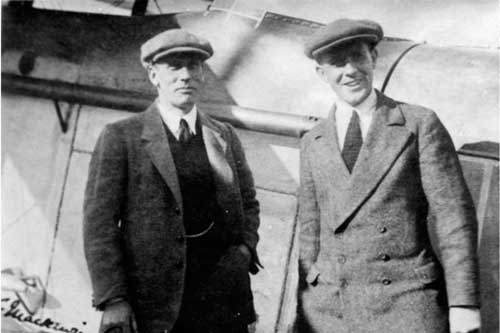
Grieve and Hawker in front of their Sopwith Atlantic
The following edition, on Saturday 24 May, a week after take-off, included a sombre editorial that the chances of hearing about their survival were growing less but still existed until all ships then at sea had arrived in port. The next edition, on 28 May, reported their safe rescue from the sea and their return to home.
These bare facts were all that was reported about the flight itself, or even the rescue. The subsequent reporting by a Danish tramp ship to a Hebridean lighthouse, the transhipment to a destroyer then to a battleship at Scapa Flow, a triumphant train journey the length of Britain to London and eventually to Kingston, entranced the Comet’s reporter because seemingly every detail was eloquently recorded.
It was a return of heroes, cheered everywhere, and even the words of the King’s telegram were repeated. The Comet continued “Had it not been a Sunday when the news of their rescue came, half the world would have gone mafficking.”*
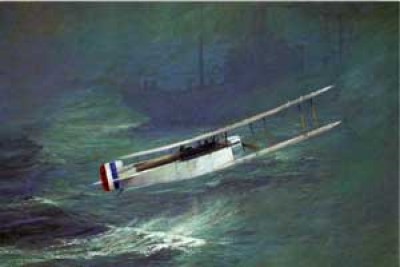
The Sopwith Atlantic ditching into the ocean in sight of a Danish ship
Besides the stilted language of the newspaper reports and the length of the portmanteau sentences themselves, which was a part of official life and the proper use of English then, it is notable that the reports were not of the aeroplane problems that forced the ditching but of the airmen and the welcome home they were afforded. This was a nation used to cheering British explorers returning from the ends of the earth; there were no expectations of hearing details or seeing newsreels of the event. The men represented the event.
Additionally, of course, this was a Kingston newspaper reporting about a Kingston man to Kingston readers. Nevertheless, the mass of detail given about even the church service of thanksgiving – to the extent of naming the hymns sung – leaves a reader wondering what happened to the aeroplane or how far the flight had progressed. Could today’s reporter fill three columns of a broadsheet paper with only descriptions of celebratory events that Mr Hawker was invited to ?
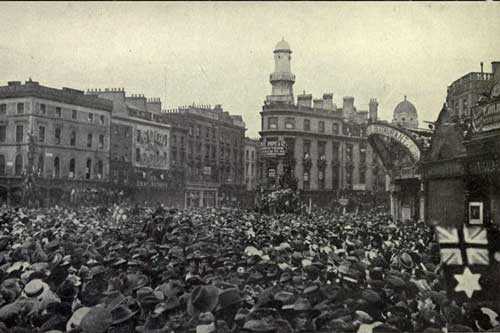
Crowds outside Kings Cross Station awaiting the arrival of Hawker and Grieve
Noteworthy was a brief mention that the Royal Aero Club would fête the men at Hendon Aerodrome on Saturday “ … and Hawker is to give looping and exhibition flights in a high speed plane …. and also carry passengers in a Sopwith … type similar to the Atlantic machine”. One assumes he had no doubts about flying again so soon.
Alec Bilney, October 2012
*This is the first time this writer has ever seen mafficking used. It is in Collins dictionary as maffick; to celebrate excessively and publicly. Remember that, although 90-plus years have passed since Hawker’s incident, the report was made less than 20 years after the relief of Mafeking in 1900, and that it was Baden-Powell who was cheered then.







